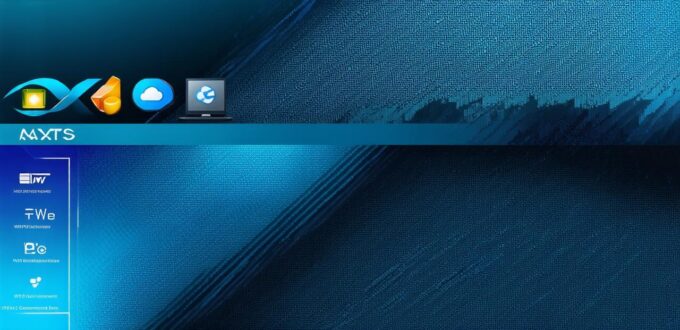Computer software refers to programs and other operating information used by computers to perform specific tasks. There are various types of computer software available in the market, each with its unique features and functions. In this article, we will discuss five common types of computer software: operating systems, productivity applications, multimedia software, system utilities, and security software.
Operating Systems (OS)
An operating system (OS) is a crucial type of computer software that manages computer hardware, software resources, and provides common services for computer programs. The most popular OS in use today are Microsoft Windows, macOS, and Linux. These OS provide users with an interface to interact with the computer, manage files, and run other applications.
Productivity Applications
Productivity applications are designed to help users perform tasks such as word processing, spreadsheet analysis, presentation creation, and data management. Some of the most popular productivity applications include Microsoft Office Suite (Word, Excel, PowerPoint), Google Workspace, and OpenOffice. These applications enable users to create, edit, and share documents and presentations with others.
Multimedia Software
Multimedia software is used for creating, editing, and sharing various forms of media such as videos, images, audio files, and animations. Some of the most popular multimedia software include Adobe Creative Suite (Photoshop, Illustrator, Premiere Pro), Final Cut Pro, and Microsoft PowerPoint. These applications provide users with advanced tools and features to create high-quality multimedia content.
System Utilities
System utilities are software programs that help maintain the performance and stability of a computer system. These programs include disk cleaners, antivirus software, registry cleaners, and system optimizers. System utilities enable users to remove temporary files, scan for viruses and malware, repair damaged registry entries, and improve the overall speed and efficiency of their computer systems.
Security Software
Security software is designed to protect a computer system from various threats such as viruses, malware, hacking attempts, and unauthorized access. Some of the most popular security software include McAfee Antivirus, Norton Security, and Bitdefender. These applications provide users with real-time protection, firewalls, and other security features to safeguard their data and systems.
Case Studies and Personal Experiences
As a software developer, I have worked on various projects that required different types of computer software. For instance, I developed an application for managing employee records using productivity applications such as Microsoft Office Suite. I also created a video editing application using multimedia software such as Adobe Creative Suite. Additionally, I have used system utilities such as Disk Cleanup to remove temporary files and improve the performance of my computer systems.
Comparisons and Figurative Language
Operating systems can be compared to the foundation of a building, providing a stable and secure platform for other software applications to run on. Productivity applications are like tools in a toolbox, enabling users to complete various tasks efficiently. Multimedia software is like a paintbrush, allowing users to create and edit multimedia content with ease. System utilities are like maintenance crews, keeping the computer system running smoothly and efficiently. Finally, security software is like a guard, protecting the computer system from external threats.

Real-life Examples
One real-life example of the importance of operating systems is when Apple released macOS Catalina in 2019, which included features such as enhanced privacy settings and improved security. This update helped to protect users’ data and systems from potential security threats. Another example is when Microsoft released Windows 10 in 2015, which introduced Cortana, a virtual assistant that can perform tasks such as web searching, emailing, and calendar management.
Productivity applications have also revolutionized the way people work. For instance, Google Docs allows users to collaborate on documents in real-time, making it easier for teams to work together on projects. Similarly, video conferencing software like Zoom and Skype have made remote work possible, allowing employees to communicate with colleagues from anywhere in the world.
Multimedia software has also had a significant impact on how people create and share content. Social media platforms such as Instagram, Facebook, and YouTube have made it easy for users to share photos, videos, and other multimedia content with their friends and followers.
System utilities are crucial for maintaining the performance and stability of computer systems. For instance, disk cleaners like Disk Cleanup can help free up valuable disk space by removing unnecessary files and programs. Similarly, antivirus software like McAfee Antivirus can protect against malware and other online threats.
Security software is essential for protecting sensitive data and preventing unauthorized access to computer systems. For instance, firewalls can block incoming traffic from unknown sources, while encryption can help protect sensitive data from being intercepted by hackers.
Do I need to use system utilities regularly?
Yes, it is recommended to use system utilities regularly to maintain the performance and stability of your computer system. System utilities such as disk cleaners, antivirus software, and registry cleaners can help remove temporary files, scan for viruses and malware, and repair damaged registry entries. It is also important to keep these programs up to date to ensure that they are protected against the latest threats.
Can I install multiple security software programs on my computer?
Yes, it is possible to install multiple security software programs on your computer. However, it is not recommended as it may slow down the performance of your computer system and create confusion about which software is providing protection. It is best to use one reputable security software program and keep it up to date. Additionally, avoid installing trial versions or freeware antivirus programs as they can be less effective and may contain malicious software.
